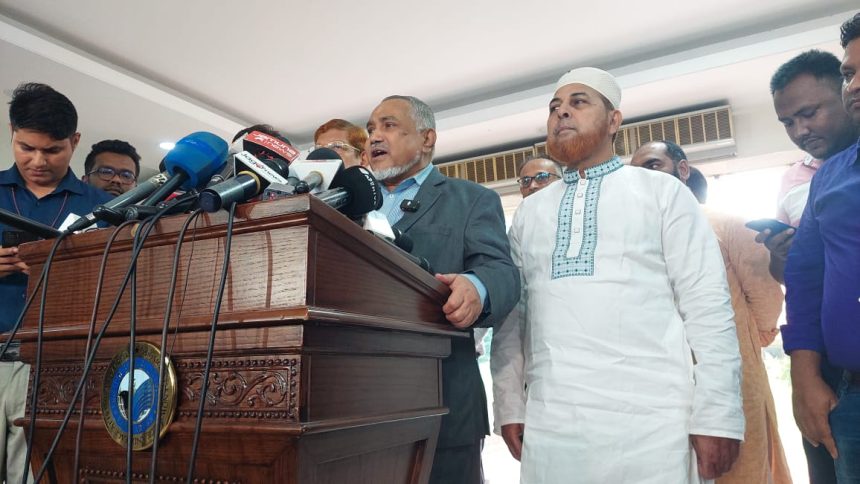Nayeb-e-Ameer of Bangladesh Jamaat-e-Islami Abdullah Mohammad Taher has emphasised the necessity of keeping the Public Service Commission (PSC) fully independent and protected under the Constitution to prevent political interference and uphold merit-based recruitment in public administration.
He made these remarks on Monday during a brief break in the 20th-day session of the second phase of talks between political parties and the National Consensus Commission, held at the Foreign Service Academy in Dhaka.
Abdullah Mohammad Taher criticised the current appointment practices, alleging that recruitment decisions are often dictated by unofficial directives rather than merit or legal procedures.
“The constitutional committee was always meant to be independent. Yet we are witnessing that regardless of rules, decisions are being made based on slips pulled out of drawers,” said Taher. “Brilliant candidates have been denied jobs due to their political views, while others have lost their positions for similar reasons. This ultimately weakens the state itself.”
Citing examples from neighboring countries, Taher said governments there do not compromise on the integrity of the PSC, regardless of which party is in power. “If capable individuals are not placed in administration, the entire state machinery becomes ineffective.” he added.
Taher proposed that the PSC must be a constitutionally established body free from influence by any party, minister, or even the prime minister. “If someone opposes this proposal, it indicates they desire interference or politicisation. But if we truly believe in fair governance, recruitment must be merit-based and neutral.”
He also addressed concerns about administrative inefficiency, stating, “Some bureaucrats are like the ghosts of authoritarianism. If we retain the same flawed recruitment systems, we’ll always be haunted by these ghosts. We want to eliminate this influence once and for all.”
On the issue of transparency, Taher pointed out that while some political parties claim to support it, they simultaneously advocate for statutory regulation instead of constitutional embedding. He rejected this idea, arguing that legal provisions can be easily altered by a parliamentary majority, compromising stability and neutrality.
“We want this matter secured within the Constitution so that it can’t be changed arbitrarily by any ruling party. We’ve seen how laws are passed in the morning and repealed by the afternoon. Such flexibility leaves room for exploitation,” he said.
Taher also invoked the legacy of the July uprising, stressing that, after 54 years of struggle against injustice, the nation must address the lack of neutrality and respect for merit in its institutions.
He claimed that more than two-thirds of political parties have already agreed on the constitutional protection for PSC, and efforts are underway to persuade others, including the BNP.
“I would like to thank BNP on behalf of Jamaat-e-Islami for not boycotting the entire program. Though they walked out during one session, they later rejoined and participated, which shows a commitment to dialogue,” Taher concluded.
Monday’s meeting focused on discussions around the Public Service Commission, the Anti-Corruption Commission (ACC), the Comptroller and Auditor General, the Ombudsman, and women’s representation in Parliament.
A total of 28 political parties and two alliances, including the BNP and Jamaat-e-Islami, took part in the session.
Members of the National Consensus Commission present at the meeting included Safar Raj Hossain, Badiul Alam Majumdar, Emdadul Haque, Iftekharuzzaman, and Ayub Mia.


